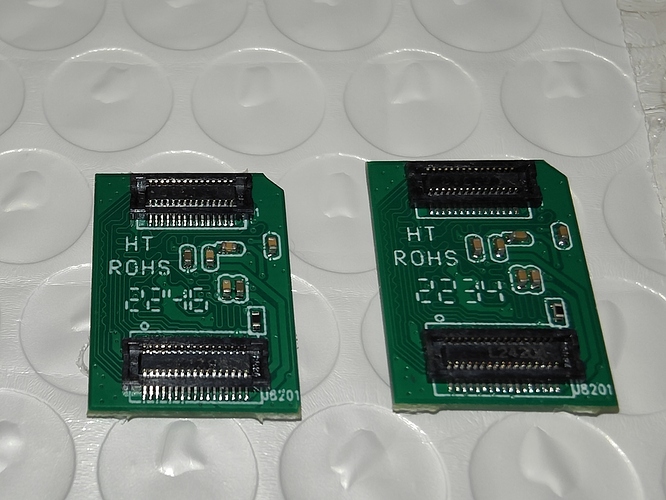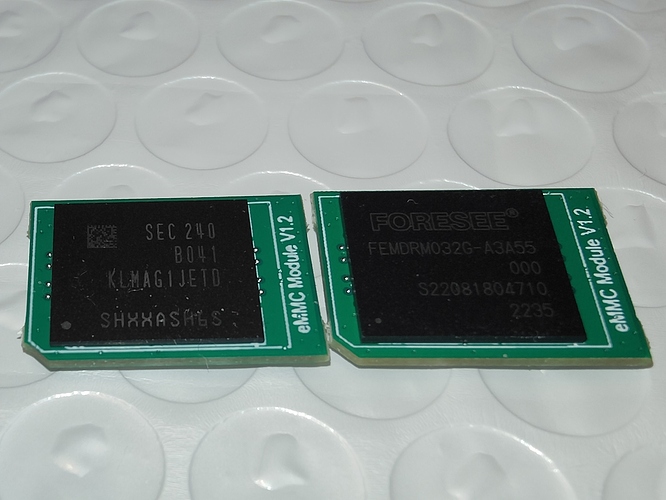I am just a normal Chinese hobby user not engineer, theTaobao allnetchina service let me find the answer on this forum without answer anything.
Can anyone tell me If I can return this emmc item to allnetchina by this issue. the 32G emmc is not cheap tho. I can stick with the sd boot since it works.
5a not boot with emmc, stack at loading debian
Could you please report the part numbers that you can find on the eMMC chips? I expect those to be Samsung or Foresee, but just wanted to confirm.
So far it is known that the modules from Allnet have compatibility problems with Rock 5A, but not with Rock 5B — there’s also a workaround available, to make those high-speed modules to be locked at half speed, which makes them work fine with 5A…
TL;DR: the problem is with the board (or, likely, with the kernel), not with the modules. Please continue the discussion in the topic you were pointed at, and please report all the data you have (specifically the eMMC part numbers) there.
Thank you for reply.I will post the pics of emmc later today. I would like keepping them till the official solution come out.
Have u tried flashing any other image other than the oficial debian?
Like this one: https://monka.systemonachip.net/rock5a/Armbian_23.05.70-rpardini_Rock-5a_jammy_legacy_5.10.160_gnome-amazingfated_desktop.img.xz
No, not yet. Maybe I will try later. Now I’m trying to build a new image for very first time.
Ok so just for the test let me know if the issue remains or not. Cause I find it wierd mine does works and… I barely touched other images.
I flash this image to the emmc by the Maskrom method, the 5a can enter the armbian login config, after finish the timezone config, it says loading the desktop enviroment, then blacksceen with a promt flash ramdomly at left up conner. I wait like 15 mints, nothing changed, so I reboot, no more login config, then same promt behavier like before. So I think this image may not working for the emmc module either.
Try flashing it again but use rpi imager this time. Do the same process and let me know. The fact it boots up to the config stuff says its working… but… wierd that it doesnt go into the desktop.
This time I use raspberry pi imager to flash the emmc, take a little longer. Can do the login config, after “starting desktop enviroment”, same as before, promt flashed nothing happen.
Since the brand new 3C with me, I maybe tweak around , try figur out is the fail of the image or the emmc.
So far the same 32G emmc module is working fine on 3C.
Try to build a new image, but can’t make the u-boot image. I follow the guide of radxa rock 5 serise wiki.
The error is blow:
…
IOError: [Errno 2] No such file or directory: ‘…/rkbin/bin/rk35/rk3588_bl31_v1.34.elf’
ls: cannot access ‘bl31_0x*.bin’: No such file or directory
MKIMAGE u-boot.itb
./tools/mkimage: Can’t open …/rkbin/bin/rk35/rk3588_ddr_lp4_2112MHz_lp5_2736MHz_v1.08.bin: No such file or directory
Error: SPL image is too large (size 0xffffffff than 0xff000)
Error: Bad parameters for image type
Usage: ./tools/mkimage -l image
-l ==> list image header information
./tools/mkimage [-x] -A arch -O os -T type -C comp -a addr -e ep -n name -d data_file[:data_file…] image
-A ==> set architecture to ‘arch’
-O ==> set operating system to ‘os’
-T ==> set image type to ‘type’
-C ==> set compression type ‘comp’
-a ==> set load address to ‘addr’ (hex)
-e ==> set entry point to ‘ep’ (hex)
-n ==> set image name to ‘name’
-d ==> use image data from ‘datafile’
-x ==> set XIP (execute in place)
./tools/mkimage [-D dtc_options] [-f fit-image.its|-f auto|-F] [-b [-b ]] [-i <ramdisk.cpio.gz>] fit-image
file is used with -f auto, it may occur multiple times.
-D => set all options for device tree compiler
-f => input filename for FIT source
-i => input filename for ramdisk file
-v => set FIT image version in decimal
Signing / verified boot not supported (CONFIG_FIT_SIGNATURE undefined)
./tools/mkimage -V ==> print version information and exit
Use ‘-T list’ to see a list of available image types
MAKE UBOOT IMAGE FAILED.
Can someone help?
I still try to flash the emmc. I found sometimes the very first boot just after the flash, the blue led can slow flash, meaning it boot to the system, I can login from ssh ,but not loading the desktop, second boot and so on, the blue led just stay light not flash, then can’t login from ssh. I caught one chance that it boot to the desktop just after flash, so I do a"sudo apt update" and “sudo apt full-upgrade”, the problem is gone. It can boot normally. So if you found the blue led flash maybe not even load the desktop, you can try to do a full upgrade by “putty” or any ssh software from pc. That’s just my temporary solution according to this topic5A corrupts eMMC (was 5A does not boot).
I just tried this image on my 5A w/ the eMMC and it’s a no go. The filesystem gets corrupted, as reported here: 5A corrupts eMMC (was 5A does not boot). There’s a new kernel coming out with some tweaks and I suspect rpardni hasn’t used the new one.
I think he hasnt… but amazingfate’s one is working better on mine: https://github.com/amazingfate/armbian-rock5b-images/releases/download/20230614-0511/Armbian_23.08.0-trunk_Rock-5a_jammy_legacy_5.10.160_gnome_desktop.img.xz
It doesn’t matter which image you’re using (unless it’s the Radxa’s one with HS200 “hand-brake workaround”), it’s the eMMC module that matters. Which one do you have?
Its answered there.
It’s another way to use the emmc. flash SD card (less size than the emmc you use)first, do the full upgrade, then Colon the image(using win32imagemanager), write to emmc. For me it worked. Still can not compile the image because the u-boot image.
Why do all this hassle when you could just dd the microsd to the eMMC directly on the running system? I mean, you don’t need to use Windows just to clone a drive
Yes, there must have lots of ways to do that. But thank you, I will try that.

